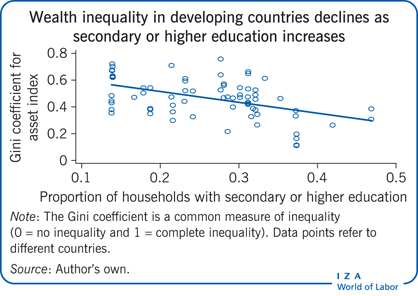Elevator pitch
Developing countries often face two well-known structural problems: high youth unemployment and high inequality. In recent decades, policymakers have increased the share of government spending on education in developing countries to address both of these issues. The empirical literature offers mixed results on which type of education is most suitable to improve gainful employment and reduce inequality: is it primary, secondary, or tertiary education? Investigating recent literature on the returns to education in selected developing countries in Africa can help to answer this question.

Key findings
Pros
Private returns to secondary or tertiary education in Africa are higher than returns to primary education, regardless of the level of development.
Lack of skilled manpower is identified as an important factor that impedes the competitiveness of firms and the modernization of the economy; investment in vocational and higher education is critical to address this skill gap.
An increase in the proportion of people with higher education may reduce wealth or income inequality.
Cons
Unemployment in developing countries tends to be higher among those with secondary or tertiary education; expanding higher education may therefore fuel unemployment.
Governments invest in primary education to address inequality in a populist manner; this also reduces the political appetite for increased investment in higher education.
As access to higher education is largely limited to high earners, expansion of higher education could potentially exacerbate inequality.